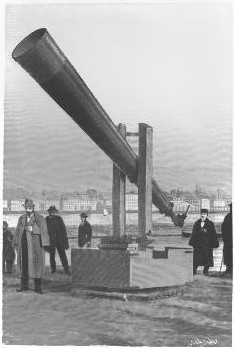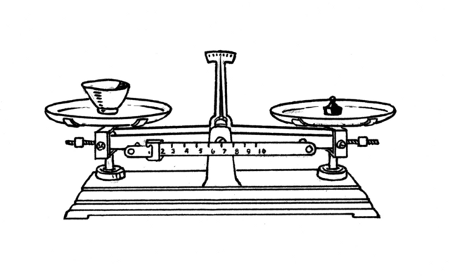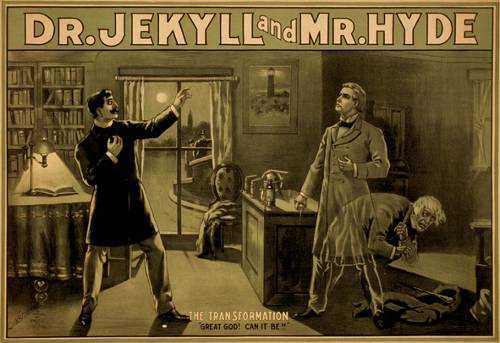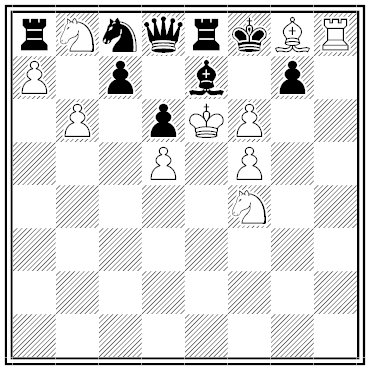The Skinhead Hamlet. Brace yourself.
Sleuthing Truths
“Twenty rules for writing detective stories,” by S.S. Van Dine, 1928:
- The reader must have equal opportunity with the detective for solving the mystery. All clues must be plainly stated and described.
- No willful tricks or deceptions may be placed on the reader other than those played legitimately by the criminal on the detective himself.
- There must be no love interest. The business in hand is to bring a criminal to the bar of justice, not to bring a lovelorn couple to the hymeneal altar.
- The detective himself, or one of the official investigators, should never turn out to be the culprit. This is bald trickery, on a par with offering some one a bright penny for a five-dollar gold piece. It’s false pretenses.
- The culprit must be determined by logical deductions — not by accident or coincidence or unmotivated confession. To solve a criminal problem in this latter fashion is like sending the reader on a deliberate wild-goose chase, and then telling him, after he has failed, that you had the object of his search up your sleeve all the time. Such an author is no better than a practical joker.
- The detective novel must have a detective in it; and a detective is not a detective unless he detects. His function is to gather clues that will eventually lead to the person who did the dirty work in the first chapter; and if the detective does not reach his conclusions through an analysis of those clues, he has no more solved his problem than the schoolboy who gets his answer out of the back of the arithmetic.
- There simply must be a corpse in a detective novel, and the deader the corpse the better. No lesser crime than murder will suffice. Three hundred pages is far too much pother for a crime other than murder. After all, the reader’s trouble and expenditure of energy must be rewarded.
- The problem of the crime must he solved by strictly naturalistic means. Such methods for learning the truth as slate-writing, ouija-boards, mind-reading, spiritualistic séances, crystal-gazing, and the like, are taboo. A reader has a chance when matching his wits with a rationalistic detective, but if he must compete with the world of spirits and go chasing about the fourth dimension of metaphysics, he is defeated ab initio.
- There must be but one detective — that is, but one protagonist of deduction — one deus ex machina. To bring the minds of three or four, or sometimes a gang of detectives to bear on a problem, is not only to disperse the interest and break the direct thread of logic, but to take an unfair advantage of the reader. If there is more than one detective the reader doesn’t know who his codeductor is. It’s like making the reader run a race with a relay team.
- The culprit must turn out to be a person who has played a more or less prominent part in the story — that is, a person with whom the reader is familiar and in whom he takes an interest.
- A servant must not be chosen by the author as the culprit. This is begging a noble question. It is a too easy solution. The culprit must be a decidedly worth-while person — one that wouldn’t ordinarily come under suspicion.
- There must be but one culprit, no matter how many murders are committed. The culprit may, of course, have a minor helper or co-plotter; but the entire onus must rest on one pair of shoulders: the entire indignation of the reader must be permitted to concentrate on a single black nature.
- Secret societies, camorras, mafias, et al., have no place in a detective story. A fascinating and truly beautiful murder is irremediably spoiled by any such wholesale culpability. To be sure, the murderer in a detective novel should be given a sporting chance; but it is going too far to grant him a secret society to fall back on. No high-class, self-respecting murderer would want such odds.
- The method of murder, and the means of detecting it, must be be rational and scientific. That is to say, pseudo-science and purely imaginative and speculative devices are not to be tolerated in the roman policier. Once an author soars into the realm of fantasy, in the Jules Verne manner, he is outside the bounds of detective fiction, cavorting in the uncharted reaches of adventure.
- The truth of the problem must at all times be apparent — provided the reader is shrewd enough to see it. By this I mean that if the reader, after learning the explanation for the crime, should reread the book, he would see that the solution had, in a sense, been staring him in the face — that all the clues really pointed to the culprit — and that, if he had been as clever as the detective, he could have solved the mystery himself without going on to the final chapter. That the clever reader does often thus solve the problem goes without saying.
- A detective novel should contain no long descriptive passages, no literary dallying with side-issues, no subtly worked-out character analyses, no ‘atmospheric’ preoccupations. Such matters have no vital place in a record of crime and deduction. They hold up the action and introduce issues irrelevant to the main purpose, which is to state a problem, analyze it, and bring it to a successful conclusion. To be sure, there must be a sufficient descriptiveness and character delineation to give the novel verisimilitude.
- A professional criminal must never be shouldered with the guilt of a crime in a detective story. Crimes by housebreakers and bandits are the province of the police departments — not of authors and brilliant amateur detectives. A really fascinating crime is one committed by a pillar of a church, or a spinster noted for her charities.
- A crime in a detective story must never turn out to be an accident or a suicide. To end an odyssey of sleuthing with such an anti-climax is to hoodwink the trusting and kind-hearted reader.
- The motives for all crimes in detective stories should be personal. International plottings and war politics belong in a different category of fiction — in secret-service tales, for instance. But a murder story must be kept gemütlich, so to speak. It must reflect the reader’s everyday experiences, and give him a certain outlet for his own repressed desires and emotions.
- And (to give my Credo an even score of items) I herewith list a few of the devices which no self-respecting detective story writer will now avail himself of. They have been employed too often, and are familiar to all true lovers of literary crime. To use them is a confession of the author’s ineptitude and lack of originality. (a) Determining the identity of the culprit by comparing the butt of a cigarette left at the scene of the crime with the brand smoked by a suspect. (b) The bogus spiritualistic séance to frighten the culprit into giving himself away. (c) Forged fingerprints. (d) The dummy-figure alibi. (e) The dog that does not bark and thereby reveals the fact that the intruder is familiar. (f) The final pinning of the crime on a twin, or a relative who looks exactly like the suspected, but innocent, person. (g) The hypodermic syringe and the knockout drops. (h) The commission of the murder in a locked room after the police have actually broken in. (i) The word association test for guilt. (j) The cipher, or code letter, which is eventually unraveled by the sleuth.
“For the writing of detective stories there are very definite laws,” Van Dine wrote, “unwritten, perhaps, but none the less binding; and every respectable and self-respecting concocter of literary mysteries lives up to them.”
See Ten Commandments and Gumshoe Polish.
Full Credit
What Alphonse Allais (1854-1905) lacked in compositional talent he made up in imagination and a wry sense of humor. His Funeral March for the Obsequies of a Deaf Man (1897), for example, is entirely blank.
Allais’ entries in Jules Lévy’s expositions of “Incoherent Art” — dedicated to the works of “people who do not know how to draw” — included a white rectangle titled First Communion of Anemic Young Girls in a Snowstorm. He followed this with a red rectangle titled Tomato Harvest on the Shore of the Red Sea, by Apoplectic Cardinals.
“There was also ‘sculpture’ with the punning title ‘Terre cuite (Pomme de),” writes Steven Moore Whiting in Satie the Bohemian. “Terre cuite by itself means terracotta; with the parenthetical qualifier, the title becomes ‘Baked Potato.'”
“A New Weather Cannon”

Ever since ‘weather shooting,’ as it is called in Germany and Switzerland, met with such pronounced success in Styria, upper ltaly, Hungary, and France, meteorologists have been engaged in a very wordy battle as to the merits of the scheme. That something has been accomplished cannot be denied. Indeed, so successful have been the efforts in preventing hailstorms in upper Italy that since the experiments of 1898 some twenty thousand stations have been established. At the Agricultural Congress held in Padua last November by far the greater number of the members were in favor of the building of ‘weathershooting’ stations. The congress was very decidedly impressed by an account of one of last summer’s hailstorms in the vicinity of Vicenza. So violent was this particular storm, the story runs, that for miles the land was completely devastated. But in this ravaged section, one spot was spared, because there it is asserted a number of stations had been located which had warded off the danger.
The shooting apparatus hitherto used has been very primitive in construction. For a cannon, a mortar with a funnel-like barrel was often used. In some places the funnel is fixed vertically in masonry. This method of mounting the cannon is not only crude, but also dangerous, for often enough serious accidents have occurred. In order to avoid these dangers as well as to improve the apparatus in general a Hungarian editor named Kanitz has devised a simple form of cannon which is essentially a breech-loading mortar some thirty feet in length. The mortar is journaled in a rotatable carriage, so that it can be raised and lowered and swung from side to side. The charge is a metallic cartridge of blasting powder. After the discharge a loud, shrill whistling is heard, lasting for about fourteen or fifteen seconds. French and Italian wine-growers insist that by means of the gun clouds are torn asunder, so that rain instead of hail falls.
The grape growers of five departments of the French Alps have formed an alliance for buying cannon and powder for next summer. The Italian government has such faith in weather-shooting that it supplies wine-growers with powder at the rate of three cents a pound.
— Scientific American, April 27, 1901
Unlovely Words
ganch
v. to impale upon hooks
glunch
v. a sullen look
thrunch
adj. much displeased
dretch
v. to trouble in sleep
No Touching

This scale balances a cup of water with a certain weight. Will the balance be upset if you put your finger in the water, if you’re careful not to touch the glass?
The Prisoner’s Restriction
A prisoner has a limited supply of paper and wants to conserve space by avoiding any letter that extends above or below the line (b, d, f, g, h, j, k, l, p, q, t, or y). How far can he get?
Pretty far, it turns out. Writer Ian Monk came up with this:
a russian con’s economic missive
we were once seven con men, we are now seven cons. as communism was over we saw easier success in american consumerism, i.e. crime. in a moscow inn, we swore: — seven is one, so one is seven … soon we came across a scam. our main man wove us a nice wee earner: — we own a zinc mine. since our russian economic crisis came in, our income’s never risen. we can cram ice in our mine’s veins, raise rumours re our ice mine’s immense resources, con morons we are mere zeros. as soon as career men see our ice, we win ’em over. once we’ve won ’em over, we receive numerous ecus or euros. as soon as we’ve our monies, we serve ’em arsenic in wine. we can even recommence on numerous occasions. … our scam was a success. our asses never saw sense. we were euros in. we saw our main man serve our vicious wine mix … a near miss .. our arsenic was mere mouse venom. some asses were survivors: — summon a coroner, someone swore. — or a nurse. — or some rozzers. so we ran. we swam across a river. as soon as no one was near us, we wove our monies in wee canvas cases we wore in our arses. we ran on. in vain … someone saw us on vanavara’s main avenue. a commissioner, nine rozzers, seven airmen, six cia men overcame us. we were sworn in. we are now in moscow in irons in room nine. as soon as someone receives or sos, come … run … save us … since no one’s ever come across our economies, our ransoms are even now in our arses.
Noted

Letter to the Times, Nov. 28, 1980:
Sir,
Mr Roger Lancelyn Green (25 November) asks whether it is known how Robert Louis Stevenson intended the name of Dr Jekyll should be pronounced. Fortunately a reporter from the San Francisco Examiner, who interviewed Stevenson in his hotel bedroom in San Francisco on 7 June 1888, asked him that very question:
‘There has been considerable discussion, Mr Stevenson, as to the pronunciation or Dr Jekyll’s name. Which do you consider to be correct?’
Stevenson (described as propped up in bed ‘wearing a white woollen nightdress and a tired look’) replied: ‘By all means let the name be pronounced as though it spelt “Jee-kill”, not “Jek-ill”. Jekyll is a very good family name in England, and over there it is pronounced in the manner stated.’
Yours faithfully,
Ernest Mehew
Good Boy
In 1990 François Caradec invented “poems for dogs.” A pet’s name is hidden phonetically in each verse; like a dog whistle, it goes unnoticed by the master but makes the dog sit up. Here’s a sample written for Elizabeth Barrett Browning’s cocker spaniel Flush:
My mistress never slights me
When taking outdoor tea.
She brings sweet cake
For her sweet sake,
Rough, luscious bones for me.
Flush was already a bit of a literary celebrity — Barrett Browning composed two poems about him, and Virginia Woolf made him the hero of a whole novel, Flush: A Biography, in 1933. In 1843, after Flush was briefly held for ransom, his mistress wrote, “Oh, and if you had seen him, when he came home & threw himself into my arms … in that dumb inarticulate ecstasy which is so affecting.”
Black and White

A curious puzzle by George Koltanowski, from America Salutes Comins Mansfield, 1983. “Who mates in 1?”
